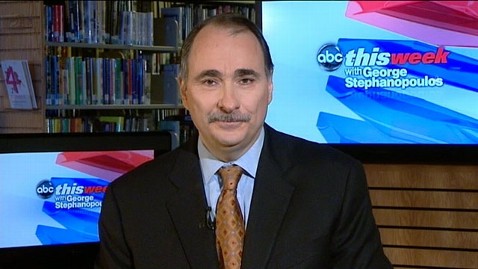David Axelrod: Don't Doubt President's Resolve on Iran

Obama campaign senior adviser David Axelrod is interviewed on "This Week."
Obama campaign senior adviser David Axelrod said that "no one should doubt the president's resolve" on Iran, and that President Obama and Israeli prime minister Benjamin Netanyahu have the same objective of preventing Iran from producing a nuclear weapon.
President Obama is set to meet with Netanyahu tomorrow at the White House for a critical summit on Iran's nuclear efforts.
"Let's first stipulate that there's no difference between the United States and Israel on the issue of whether Iran should get a nuclear weapon," Axelrod told me on "This Week." "They're going to sit down and they are going to talk through the tactics involved, but no one should doubt the president's resolve."
"Not just because of the security of Israel, but because of the security of the United States of America," Axelrod added. "It is important that Iran not get a nuclear weapon."
In some of his clearest language yet on the issue, President Obama told The Atlantic's Jeffrey Goldberg "I don't bluff" when discussing Iran's nuclear program, and that all options were on the table to prevent Iran from gaining nuclear capability.
"I think that the Israeli government recognizes that, as president of the United States, I don't bluff," President Obama told Goldberg in an interview last week. "[B]oth the Iranian and the Israeli governments recognize that when the United States says it is unacceptable for Iran to have a nuclear weapon, we mean what we say."
Republican presidential candidate Newt Gingrich called President Obama's comments "a good step in the right direction," but questioned whether the Obama administration will be willing to move as quickly as Israel to prevent Iran from producing a nuclear weapon.
"The question for the president is, if the Israeli prime minister decides that he cannot afford to take the risk of waiting to see whether or not the intelligence agencies are right, and he decides that for the survival of Israel, he has to do something to take out the weapons systems, will the president in fact support him or will the president try to stop him?" Gingrich told me on "This Week."
"I think that's the core question. Because I think the Israelis are likely to move much, much earlier than an American president would," Gingrich added.
Goldberg said President Obama had two main messages in his interview - convincing Iran to take his words seriously, while also cautioning Israel's Netanyahu against a unilateral attack this year on Iranian nuclear facilities.
"The more important message at the moment was right to the prime minister, which is, please, also, you take me seriously when I say that Iran is not going to cross the threshold on my watch," Goldberg said. "So don't do anything precipitous."
ABC News Global Affairs anchor Christiane Amanpour said that while President Obama's language has toughened, the administration is still hoping to avoid military confrontation through continued sanctions and diplomacy.
"The White House is saying … to anybody who will listen, that we believe there is still time and space for diplomacy," Amanpour said. "Not only that, we believe that what we're doing right now with the sanctions are really hurting, but in a negotiated way to try to make a permanent solution to this nuclear crisis, rather than a military strike."
Goldberg said the public responses after tomorrow's meeting between Obama and Netanyahu will be key to the road ahead.
"If Netanyahu comes out and says the president and I had a good conversation, and I really believe that sanctions are working, and they are crippling, and leaves it at that, we'll know there's not going to be an attack," Goldberg said. "If he comes out and says, I want to praise the president for the strong sanctions regime, nevertheless the Iranians are racing toward a bomb, then we're looking at something else."